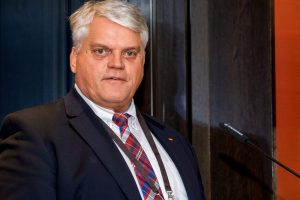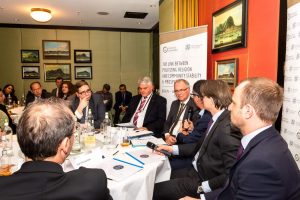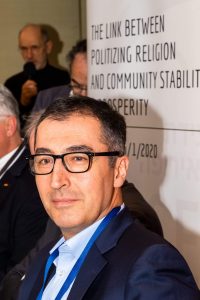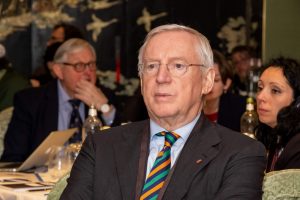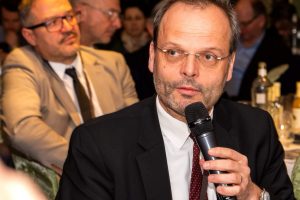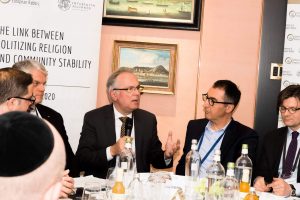17 January 2020
The Conference of European Rabbis and the Interfaith Alliance for Safer Communities Join Forces to Host a Conference Exploring the Link Between Politicization of Religion and Community Stability & Prosperity

BERLIN – JANUARY 17th 2020 – The Conference of European Rabbis (CER) together with the Interfaith Alliance for Safer Communities (IAFSC) yesterday hosted a conference to discuss the challenges that communities are facing as a result of politicization of religion and the rise in hate crime, as well as successful examples of countering these negative influences. This conference builds on the work accomplished during workshop in the United States, Russia and France which explored the role of faith leaders in combating hate crime.
The forum was convened under the conviction that the challenge presented by violent extremism and hate crimes requires a comprehensive approach that brings together diverse perspectives. Attendees discussed patterns of politicization of religion in various national and international contexts, and how this interplays with community stability and prosperity. Dialogue was also facilitated on what constitutes a hate crime and how it can be combatted; religion as a political tool of control; the thin line between hate crimes and terrorism and what early measures can be taken; the modern history of radicalization in Europe; the politicizing of religion and its impact on communities in Europe and how religion can be a voice of hope in modern societies; and who is benefiting from politicizing religion and encouraging hate crimes.
Chief Rabbi Pinchas Goldschmidt, Chief Rabbi of Moscow and President of the Conference of European Rabbis, said, “The Conference of European Rabbis and the Interfaith Alliance for Safer Communities operate under the aligned acknowledgment that empowering faith leaders with the knowledge and expertise to play an active and effective role in community safety will be integral to the stability, security and development of our society. Increasingly, faith is being harnessed to advance political and extremist agendas and community interventions to thwart extremism are crucial. Alongside the IAFSC, the Conference of European Rabbis is collectively committed to playing our part in countering the manipulation of faith for political means.”
Speakers included amongst others Prof. Peter Neumann of King’s College, London; Cem Özdemir, MP, Chairman of the Committee on Transport and Digital Infrastructure, The Greens Parliamentary Group, German Bundestag; MP, Federal Government Commissioner for Global Freedom of Religion, Federal Prof. Dr Heribert Hirte, MP, Deputy Chairman, Committee on Legal Affairs and Consumer Protection, CDU/CSU-Parliamentary Group, German Bundestag; Dr Felix Klein, Federal Government Commissioner for Jewish Life in Germany and the Fight against Anti-Semitism; Moderator: Dr Daniel Gerlach, Co-Founder and Managing Director, Candid-Foundation; Viola van Melis, Head of Center for Research Communication, Cluster of Excellence, Religion and Politics, University of Münster; Olivier Guitta, Managing Director, GlobalStrat, London; Stephan J. Kramer, President, Office for the Protection of the Constitution, Free State of Thuringia; Mirco Keilberth, German North Africa Correspondent, Tunisia
About The Conference of European Rabbis
The Conference of European Rabbis (CER) is the primary Orthodox rabbinical alliance in Europe. It unites more than 700 religious leaders of the mainstream synagogue communities in Europe. The Conference of European Rabbis is mandated to defend the religious rights of Jews in Europe, and has become the voice of Judaism for the European continent. The CER is also committed to inter-religious dialogue with Muslims and Christians in order to counter the increasing radicalization in politics and society and to increase the security of local religious communities. The President of the CER is Chief Rabbi of Moscow, Pinchas Goldschmidt.
About The Interfaith Alliance for Safer Communities
The Interfaith Alliance for Safer Communities was established to empower faith leaders to work for the safety and security of our communities, tacking issues such as child sexual abuse, extremism, radicalization and human trafficking. We aim to facilitate the building of bridges between faiths, NGOs and experts in various domains. We are conscious of the importance of empowering faith leaders, both at the institutional and grass-root levels, with knowledge and to mobilize them to play an active role in community safety. Our current areas of focus are ‘Child Dignity in the Digital World’ and ‘Hate in our Communities’.


